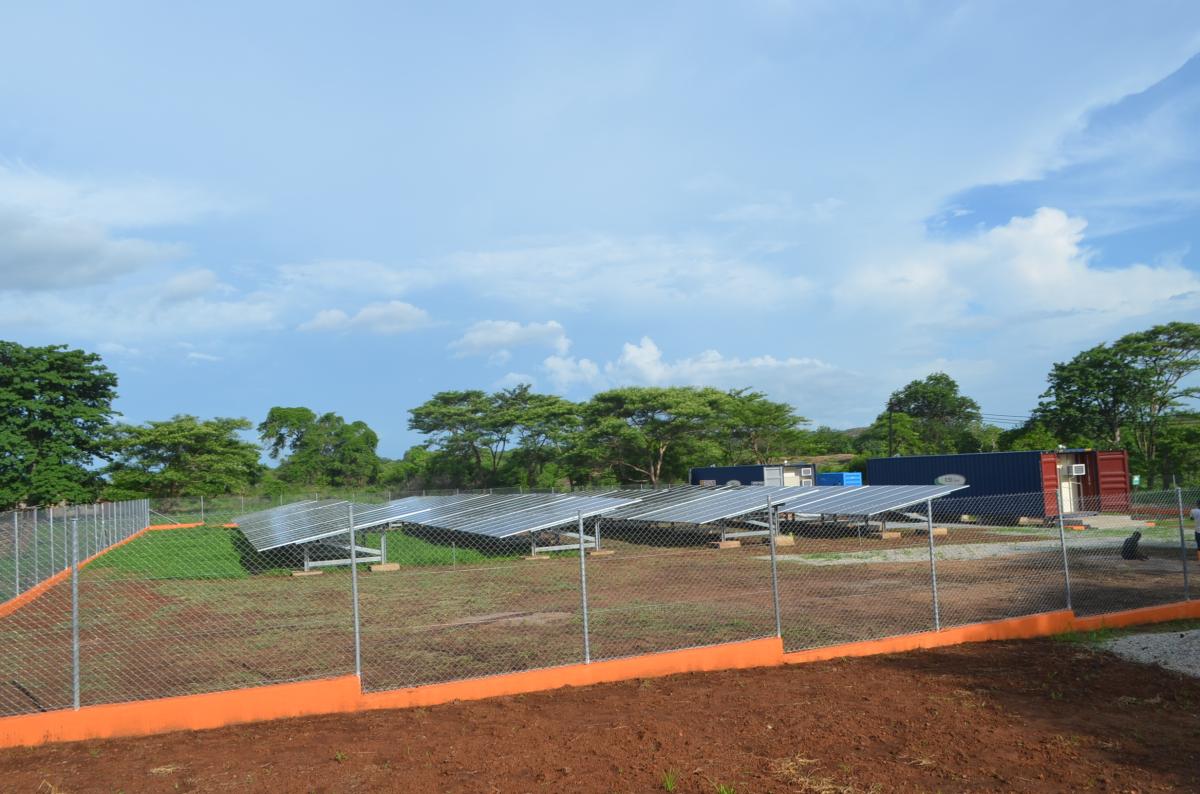Search
Viewing 1 to 15 of 46 news
-
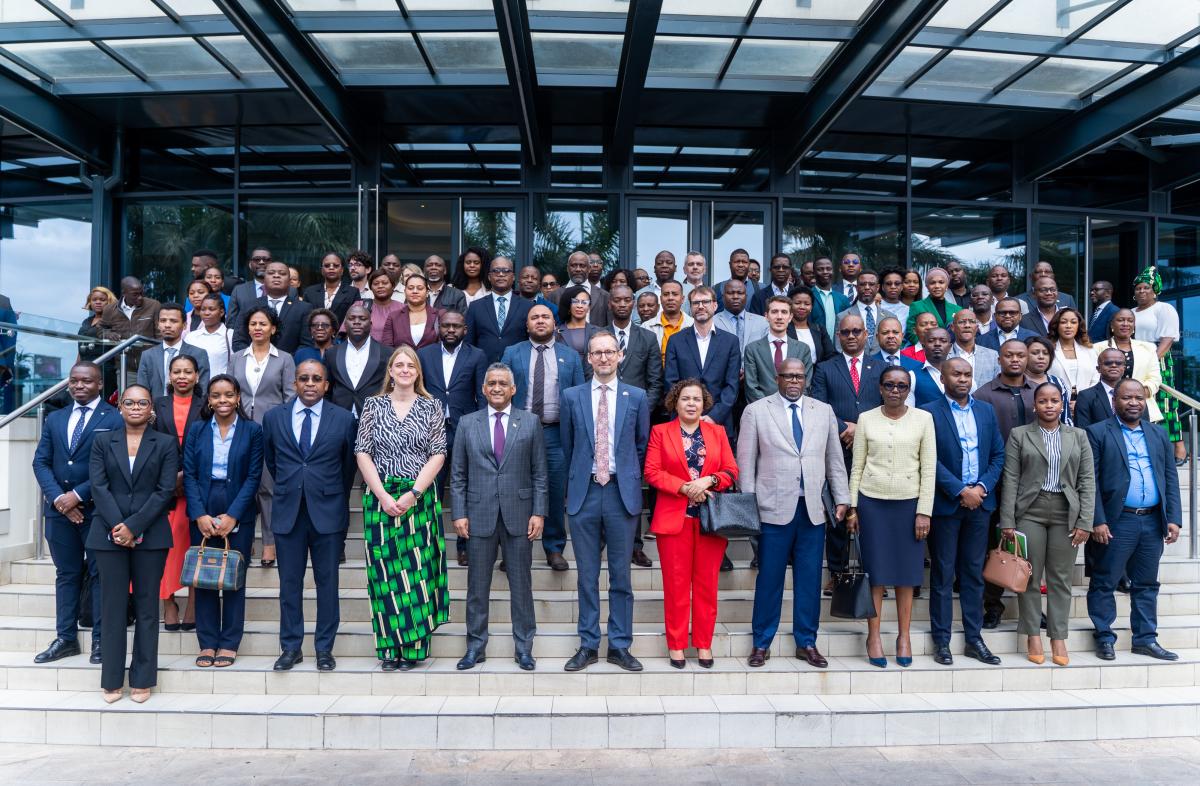
Mozambique’s First Climate Finance Conference: Turning vision into a national movement
Velsoma CUMBANA | 18/12/2025
Mozambique took a decisive step towards climate-resilient growth this October, hosting its first National Climate Finance Conference in Maputo. For two days, history was made, not only because this was a long-awaited milestone, but with the announcement of the 10-year Climate Finance Strategy, the event officially marked the moment climate shifts from being a niche topic and becomes the main language of national economic planning. But these gears started moving well before October. Even before 2025. Here is the story behind the history. From Awareness to Action Few countries feel the weight of climate change as tangibly as Mozambique — with over 75 extreme weather events recorded between 2000 and 2023, leaving behind billions in losses and hard-earned lessons in resilience. More than 1.6 million Mozambicans could be pushed into poverty by 2050 if climate action falls short. Yet, where others only see risk, Mozambique now sees an opportunity: to transform vulnerability into innovation, and climate challenge into an engine of growth. That conviction guided the creation of the National Directorate of Climate Finance (DNFC) in 2023, a landmark reform proudly supported by Enabel through the bilateral cooperation with the Kingdom of Belgium. The Directorate, now nested within the Ministry of Planning and Development, is designed to ensure that climate finance becomes a pillar of economic governance, linking fiscal policy, investment, and resilience planning. “Mozambique lives a decisive moment in its history. Climate change is no longer a distant threat. It is a daily reality,” said H.E. Salim Valá, Minister of Planning and Development. “Each drought, cyclone, and flood reminds us that the time for action is now.” Partnerships that Move the NeedleBehind this transformation is a partnership grounded in trust and shared vision. Belgium and Mozambique have worked hand in hand to build not only the strategy but also the institutional muscle needed to make climate finance work for people. “The creation of the National Directorate of Climate Finance shows how Mozambique views climate finance as a central pillar for sustainable development,” said H.E. Delphine Perremans, Head of Belgium’s Diplomatic Bureau in Maputo. “We are proud to share Belgian expertise, through Enabel, to help regulate carbon markets, access international funds, and integrate climate into public financial management.” This partnership is already producing results. Last year, Mozambique and Belgium kickstarted the conversion of €2.4 million of public debt into direct investments for climate resilience. A tangible example of how diplomacy and development cooperation can converge to create impact. Shaping the Future of Climate Finance The National Climate Finance Strategy 2025–2034, presented during the conference, is Mozambique’s blueprint for this next chapter. It introduces a coordinated system to mobilise domestic and international finance for climate action, while promoting innovative mechanisms such as carbon credits, green taxation, insurance, and debt-for-climate swaps. But beyond its technical design, the strategy signals a shift in mindset: from reactive response to strategic investment. For the first time, climate finance is being seen not as a cost to bear, but as a catalyst for fiscal stability, job creation, and inclusive growth. “Climate finance is not a cost. It is an investment in our future - in our food security, our education, and our peace,” Minister Valá reminded participants. “This conference symbolises our collective commitment to turn ideas into commitments, and commitments into measurable results.” A Conference that Redefined the Conversation The two-day event gathered voices from ministries, banks, academia, and civil society to discuss how climate finance can move from concept to practice. Panels explored different topics yet, what stood out most was not the technical content but the tone: pragmatic, visionary, and united. Each discussion pointed to one conclusion — that climate resilience is no longer an environmental agenda but an economic one. The First National Climate Finance Conference will not be remembered for its speeches, but for what it launched: a collective effort to make climate finance a driver of national development. It has inspired new partnerships, strengthened existing ones, opened dialogue between the public and private sectors, and positioned Mozambique as a pioneer in Africa’s climate finance landscape. Through collaboration with Belgium and other partners, Mozambique is redefining what climate finance means: not just funds for recovery, but capital for transformation. For Enabel, partnering with the government in this journey is about being a bridge between global mechanisms and local priorities. It is about connecting dots: between data and decisions, between vision and execution, and between institutions that must collaborate to make the system work. As highlighted by Adriaan Tas, Enabel’s Country Director in Mozambique: “Our partnership is not just about funding projects; it’s about helping the government of Mozambique build a financial architecture that can sustain its climate ambitions for decades. We are building the foundations for an economy that grows because it is green — not despite it.”
-
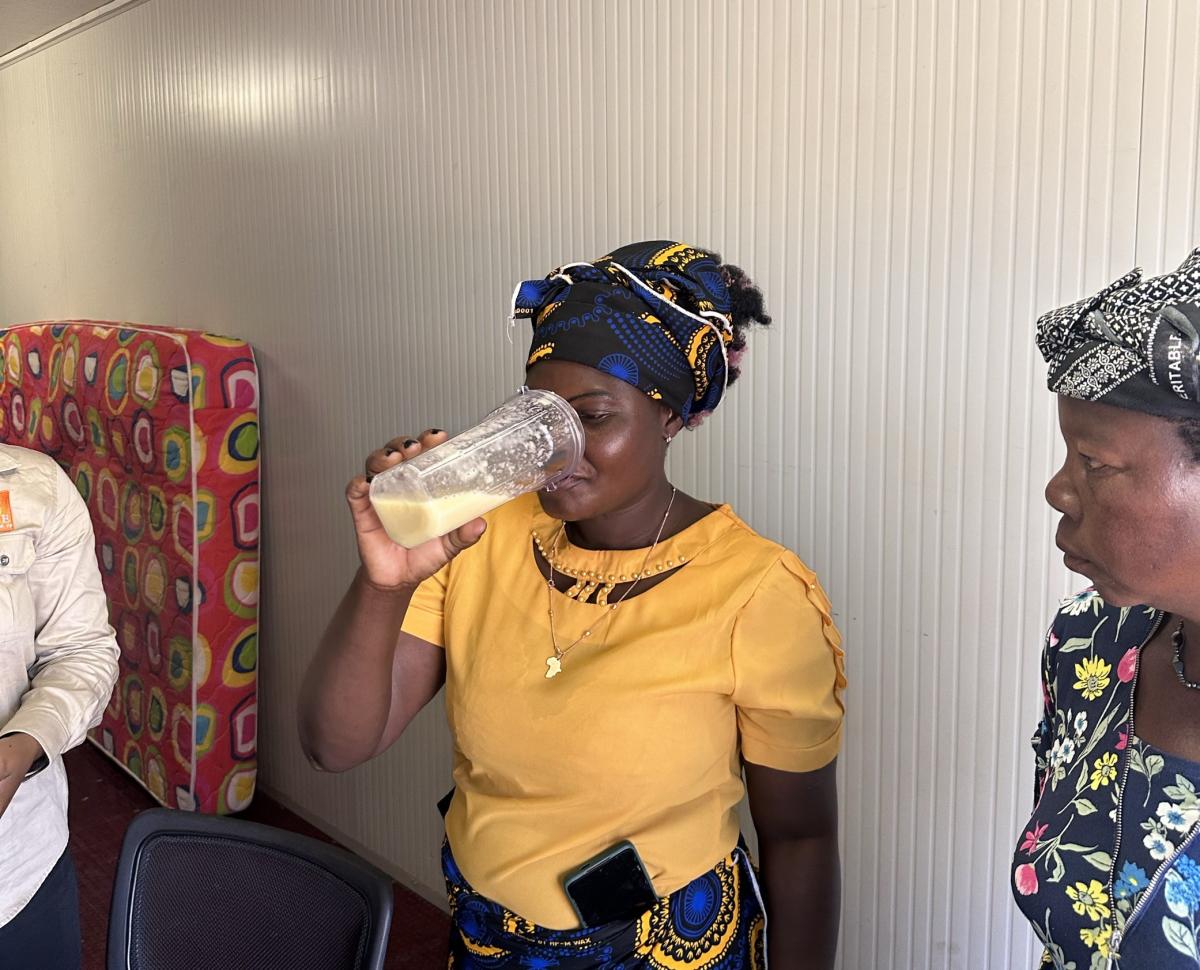
Inclusive Energy Transitions: Lessons from Rural Mozambique
Velsoma CUMBANA | 29/09/2025
From Power to Empowerment: Gender, Culture and Participation in Renewable Energy Transition In the villages of Muite and Milhana in Mozambique, access to electricity through solar mini-grids has brought new opportunities—but real change goes beyond infrastructure. In Muite, evenings once ended under kerosene lamps and smoky kitchens. Today, solar mini-grids hum quietly in the background, powering lightbulbs, mixers, and welding machines. However, electricity alone does not change habits. For an energy transition to be just and lasting, it must be shaped by the voices, local traditions, and daily realities of the communities it serves. Turning Energy Access into Inclusive Development Through the Renewable Energy for Rural Development Project (RERD2+), Enabel and the Mozambican National Fund of Energy (FUNAE) have realized five solar mini-grids in Nampula and Zambezia provinces. The project’s ambition goes beyond lighting homes: it seeks to transform energy access into a catalyst for entrepreneurship and inclusive development. In collaboration with a local consultancy, the project facilitated access to electrical working tools for local professional associations in metalworking, carpentry, and cooking to develop their businesses. This was accompanied by technical demonstrations and follow-up visits organized with FUNAE in June 2025. These visits highlighted an essential truth. Infrastructure alone is not transformative. Adoption depends on how well new technologies fit into people’s daily routines, cultural norms, and community dynamics. From Biomass to Clean Cooking This is particularly visible in the shift from firewood and charcoal to clean cooking technologies. To support this shift in Muite and Milhana, the project provided cooking associations with electric stoves, grills and mixers as healthier and more sustainable alternatives. However, many of these appliances remained unused, in part caused by a lack of familiarity. Cooking demonstrations were organized in response, but these sessions also revealed deeper social challenges. For demonstrations to be effective, they must go beyond individual skill-building and consider how technologies are adopted within communities and households. In Mozambique, as in many countries, cooking is a gendered activity. Traditions and techniques are passed down through generations, and the kitchen becomes a space where gender norms and intergenerational socialization converge. Clean cooking equipment enters this space with the potential to disrupt habits, particularly when it changes taste or texture. Associations in both villages are composed almost entirely of women, yet in many dual headed households men control finances, influencing decisions about whether electricity bills are paid or appliances replaced. Generational differences also shape adoption. In Muite, older women were the ones attending the demonstrations, while younger women were assigned other tasks, limiting both intergenerational learning and the legitimacy of the new technologies. For clean cooking to take root, trainings must ensure participation across age groups and engage the wider community, men included. Cooking for Empowerment Cooking associations are not only guardians of food traditions, but they are also entrepreneurs. By catering to local festivities, they generate income and visibility. For this model to thrive, new technologies must be accepted by both association members and their communities. In Milhana, for example, an electric mixer was introduced by preparing juice from local produce and sharing it among men and women. This simple act created enthusiasm and showed how demonstrations grounded in familiar tastes and ingredients can foster both community acceptance and consequently enterprise growth. Culture and Technology: A Necessary Integration The experience of RERD2+ demonstrates that behavioral change in energy use is never purely technical. It requires a deep understanding of culture, identity, and relationships. Clean cooking illustrates this vividly: even when technologies promise health and environmental benefits, they risk rejection if they do not respect local practices and preferences. Renewable energy solutions must therefore be designed with communities, rather than for them to be impactful. Demonstrations that reflect local diets, workshops that include different generations, and spaces where both women and men can participate create legitimacy and ownership. When infrastructure is adapted to context and people are active partners in its use, electricity becomes more than power. It becomes empowerment.
-
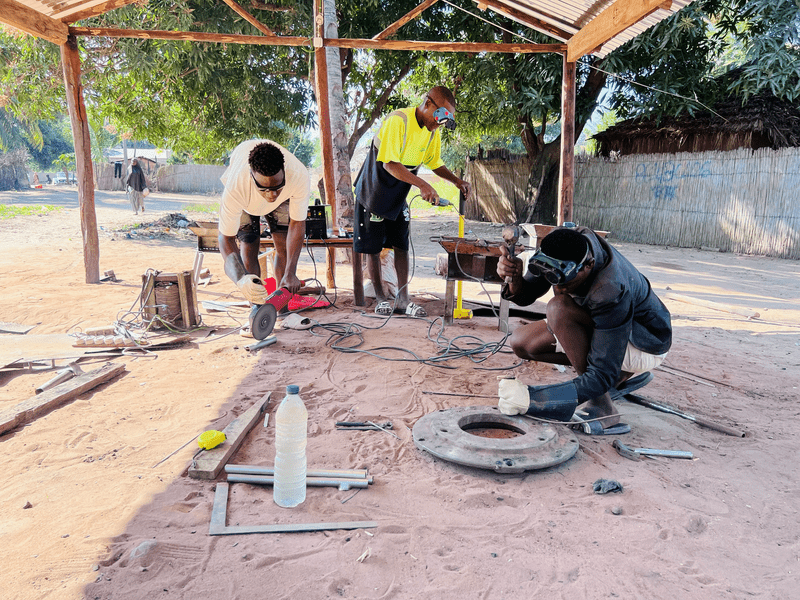
Powering Rural Development: How Solar Mini-Grids Are Transforming Mozambique’s Countryside
Velsoma CUMBANA | 28/05/2025
Access to energy is still a challenge across the Mozambican territory. This lack of energy isn’t just about darkness after sunset - it limits access to healthcare, education, business opportunities, and the tools communities need to thrive. Through the Renewable Energy for Rural Development (RERD2+) project, Enabel in partnership with FUNAE, with the financing of the Belgian Development Cooperation, five mini-grids are up and running across Zambézia and Nampula, delivering over 800 kWp of clean energy. More than 18,000 people - along with 200 businesses, schools, and health centers - are now connected to reliable power. Going Beyond ElectricityElectricity demand is rising across all five sites, though at varying rates. In the most dynamic location, energy demand has doubled in just six months. In contrast, the least performing site is expected to reach the same demand growth only within the next five years. These trends highlight the reality that for mini-grids to be commercially viable, energy uptake must grow rapidly and be actively supported. Without paying users (households, businesses, or institutions) even the best infrastructure risks failure. However, enhancing energy demand isn’t as simple as flipping a switch. While households benefit from basic uses like lighting, radios, or televisions — which do improve daily life — the real power of electricity lies in what it can fuel. So, the challenge is to match energy access with economic activation. After all, scaling these systems cannot rest solely on the shoulders of the public sector and it requires participation and investment from the private sector to ensure long-term impact. Small and medium-sized enterprises (SMEs) such as those engaged in handicrafts, welding, or agriculture are critical, not only as major energy consumers, but also as engines of local job creation and income generation. Rethinking Design and ImplementationThat’s why we are taking a new approach looking at embedding economic development opportunities as a core component in the design, construction, and operationalisation of mini-grids. Promoting the productive use of energy (PUE) must go hand in hand with infrastructure deployment through raising community awareness, supporting entrepreneurship, and strengthening local businesses. This integrated approach ensures that the electricity not only powers the communities, but also enhances socio-economic development. As stakeholders and innovators recently gathered at the National Renewable Energy Business Conference – RENMOZ – we used the platform to share these key learnings and help shape the next wave of investment, policy, and partnerships needed to scale rural electrification and unlock its full potential for economic transformation. Looking ahead, site selection for future mini-grid investments must incorporate three critical dimensions: economic activity readiness, availability of social infrastructure and services before electrification, and demand activation potential. These indicators will not only inform where to invest, but also shape the types of incentives, de-risking strategies, or risk-sharing mechanisms that public investors should align with the private sector as preferred partner for operationalising the grids in the long run. As Mozambique advances its energy transition agenda, Enabel remains committed to scaling this model, ensuring that future investments are impactful and backed by strong partnerships between the private and public sector.
-

Climate Planning in Gaza: a Model for the Future
Velsoma CUMBANA | 16/05/2025
Imagine a dam. It is installed near the source of a river in district 'A'. The river runs through two more districts - let's call them districts 'B' and 'C'. This dam, which holds back the fury of the waters in times of flood, is damaged and the flood spreads to the underlying districts. Administratively, this situation is the sole responsibility of district 'A', where the infrastructure is located. But climate change does not recognise the concept of jurisdiction. This is the scenario that Dr. Calisto Microsse, from the Adaptation Department of the Ministry of Agriculture, Environment and Fisheries, uses to illustrate the need to draw up Provincial Plans of Adaptation (PPA). Local adaptation plans already exist in many districts, however, not sufficient to deal with the impacts of climate change that cross administrative boundaries. But what is an Adaptation Plan? Generally speaking, it is a long-term integrated strategy aimed at preparing for and mitigating the effects of climate change. It proposes practical actions to mobilise resources to protect the environment and make communities more resilient. Collaboration: beginning, in-between and beyond... In line with the National Strategy for Adaptation and Mitigation of Climate Change 2013-2025, the current Mozambique-Belgium bilateral cooperation portfolio sets climate resilience as a priority. Enabel engaged in a collaboration with the government to turn this gap into an opportunity to strengthen adaptation at provincial level, trying to hone a replicable model that goes beyond local plans, unifying efforts at provincial level. And so began the journey of drawing up Gaza's PPA, the second in the country, after Zambezia's. The methodology was refined on the basis of Zambezia's experience. The existing script was enriched, ensuring more effective alignment between the different scales of intervention and better integration of provincial specificities. The fundamental principles of this approach include adding value and complementarity, respecting the principle of subsidiarity (dealing only with issues that cannot be resolved at district level), improving the business environment and targeting investments. Based on these lessons, a model was designed that would be tested in the districts of Bilene on the coast, and Guijá in the middle and Mapai in the interior of Gaza province, southern Mozambique. The core team describes the process as highly collaborative, not only between the government, Enabel, Eduardo Mondlane University (UEM) and the communities, but also with the involvement of various non-governmental organisations working in the selected areas, academia and the private sector. Coordination was centralised at the level of the Gaza provincial government, which ensured structured and effective implementation. The mobilisation of a specialised consultancy from UEM made it possible to reinforce the provincial technical team, ensuring the application of a scientifically informed approach adapted to local realities. The academic consultant, Professor Jânio Dambo, says that the contribution of the local authorities was fundamental and crucial to the quality of the PPA, since they have essential information about the impacts of climate change on their territory. With the training and engagement of the provincial technical team through technicians from the provincial directorates and services for the environment, agriculture, public works, finance, fisheries, gender and social protection, meteorology and disaster risk management, the process of collecting and analysing data became more robust. The needs became clear and the adaptation plan took shape. The Plan, Outlook and ExpectationsThis Provincial Adaptation Plan presents a facilitative and integrative approach to strengthening local ones, ensuring greater coordination, capacity building, and funding for climate actions within districts and for initiatives that go beyond district boundaries.The plan outlines monitoring, training, and resource mobilization activities, leaving direct investments to the district plans, in accordance with the principle of subsidiarity. In this way, the PPA serves as a supporting instrument, fostering an enabling environment for the effective implementation of adaptation measures at the local level. In a large room in the provincial capital, Xai-Xai, the Plan was presented to the Provincial Advisory Council, with the presence of local authorities, including the Secretary of State and the Governor of the Province. It was unanimously approved, reinforcing the province’s commitment to supporting districts in implementing resilient adaptation measures. As implementation begins, it is expected that local plans will be strengthened by providing the necessary tools and resources to thrive in the face of climate challenges. Professor Dambo explains that the success of this implementation “can turn the province into a model of climate resilience, ensuring food, water, and environmental security for the population.” By integrating strategic planning, technical resources, and community participation, the Gaza PPA sets a replicable path to reducing vulnerabilities and ensuring the sustainable development of other provinces.
-
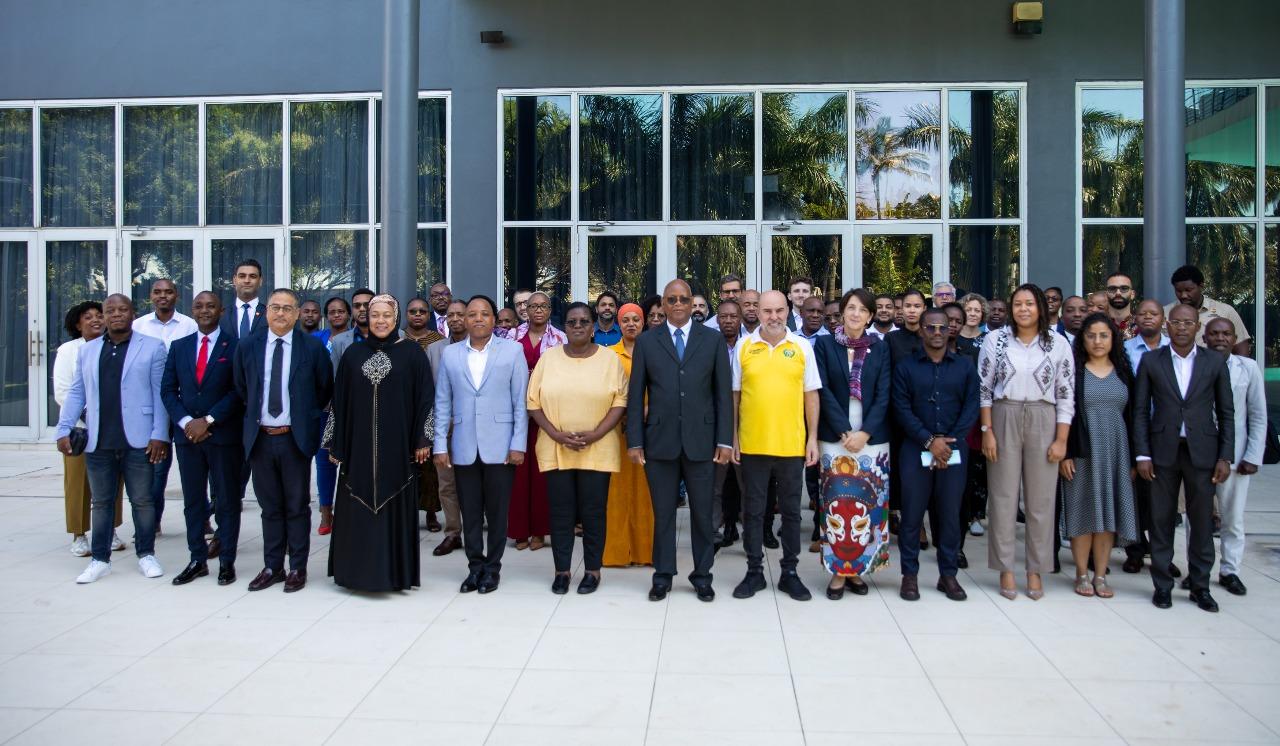
From Waste to Resources: Enabling Mozambique’s Circular Economy with Mitigation Action Facility Support
Velsoma CUMBANA | 02/05/2025
On 28 March 2025, Government officials, development partners, the private sector and civil society convened in Maputo to officially launch a €18,4 Million support from the Mitigation Action Facility’s to the ValoRe Programme, Mozambique’s flagship initiative for sustainable waste management. Far from being just another milestone, this moment set the stage for a new era in addressing one of the country’s most pressing environmental challenges. A Bold Solution to a Growing Challenge Mozambique faces the daunting task of managing over four million tons of municipal solid waste each year, much of it ending up in open dumpsites. Statistics say only 30% of it is collected and a mere 1% recycled. According to the speech of the State Secretary of Land and Environment, H.E. Gustavo Dgedge, who officially launched the Mitigation Action Facility Support for ValoRe, “a strong urban growth, combined with national economic development, constitutes a significant challenge for municipal areas that generate more than 2 million tonnes of solid urban waste every year, which could be an opportunity to promote investments associated with waste recovery”. To tackle this challenge, ValoRe programme has a transformative vision: to recognise waste as a valuable resource rather than a perpetual environmental and social liability. By blending robust policy measures and practical on-the-ground interventions, ValoRe aims to boost recycling rates, improve waste collection, and integrate new treatment technologies—benefiting both urban centers and surrounding communities. Yet, true transformation requires more than ambition. It needs investment, innovation, and broad-based partnerships. That’s where the Mitigation Action Facility stepped in, channelling financing and expertise to expand the program’s scope and impact, which will result in the construction and operation of 3 typical waste infrastructure projects: Landfill, Materials Recovery Facility and Composting Centre. The operation of these infrastructures will be based on public-private partnership models, giving the private sector the opportunity to operate with the technical supervision of the municipalities. The National Director of the Environment in the Ministry of Agriculture, Environment and Fisheries, Mrs. Guilhermina Amurane, referred to a long process that led to the approval of this funding, whose concept note was approved in 2018, and the detailed proposal approved in November 2023. During this process, the signature of the Ministerial Diploma of the Environmental Tax on Packaging (TAE) in November 2024 was crucial for the confirmation for the second phase of the Mitigation Action Facility support which will end in 2029. The Partnership Driving Change On the implementation side for the support sits a partnership between Enabel, the Ministry of Agriculture, Environment and Fisheries through its National Directorate of Environment, National Sustainable Development Fund and the National Association of Municipalities of Mozambique. During her remarks at the launch, Sandra Galbusera, Enabel’s Country Director spoke about the alignment of this program with the 2023–2029 bilateral cooperation framework between Mozambique and Belgium. According to her, ValoRe is not just about building better waste infrastructure, it’s about empowering communities, bringing dignity for waste collectors, and driving a shift towards a circular economy that benefits everyone. The Mitigation Action Facility support to ValoRe is based on the values of impactful changes, such as Inclusivity, considering that the ValoRe brings together government bodies, private sector, technical experts, and local communities under a shared-responsibility framework; Innovation, with tools like the Environmental Packaging Tax and results-based financing, which reward municipalities and partners for reducing, reusing, and recycling waste; Focus, considering the target municipalities—Nampula, Nacala, and Pemba— which will receive dedicated support for improving collection, segregation, and treatment systems. Speaking of results, until 2029, the program aims to sustainably treat 348,330 tonnes of waste, create 110 direct and additional 1,680 indirect jobs in waste infrastructures while benefiting at least 2,000 from the closure of the existent uncontrolled dumps and enable the improvement of technical capacities in the Ministry of Agriculture, Environment and Fisheries and the National Fund for Sustainable Development. Looking AheadMore than statistics, each of these numbers represent a human story. For the thousands of informal waste collectors, ValoRe offers a promise of better working conditions and enhanced income opportunities. For families dealing with overflowing dumpsites, it represents a path to healthier living environments. And for businesses interested in recycling, ValoRe paves the way for new ventures that are both profitable and planet-friendly. The program’s financial window - co-financed by the Mitigation Action Facility - provides a platform for private-sector players and municipal authorities to co-develop long-term solutions. The event was more than a ceremonial launch. It was a collective affirmation that Mozambique stands at the forefront of tackling waste management in a sustainable, inclusive, and forward-looking way. This is about leaving no one behind. The best part? We are just getting started and very excited to share more about the results of this journey.
-
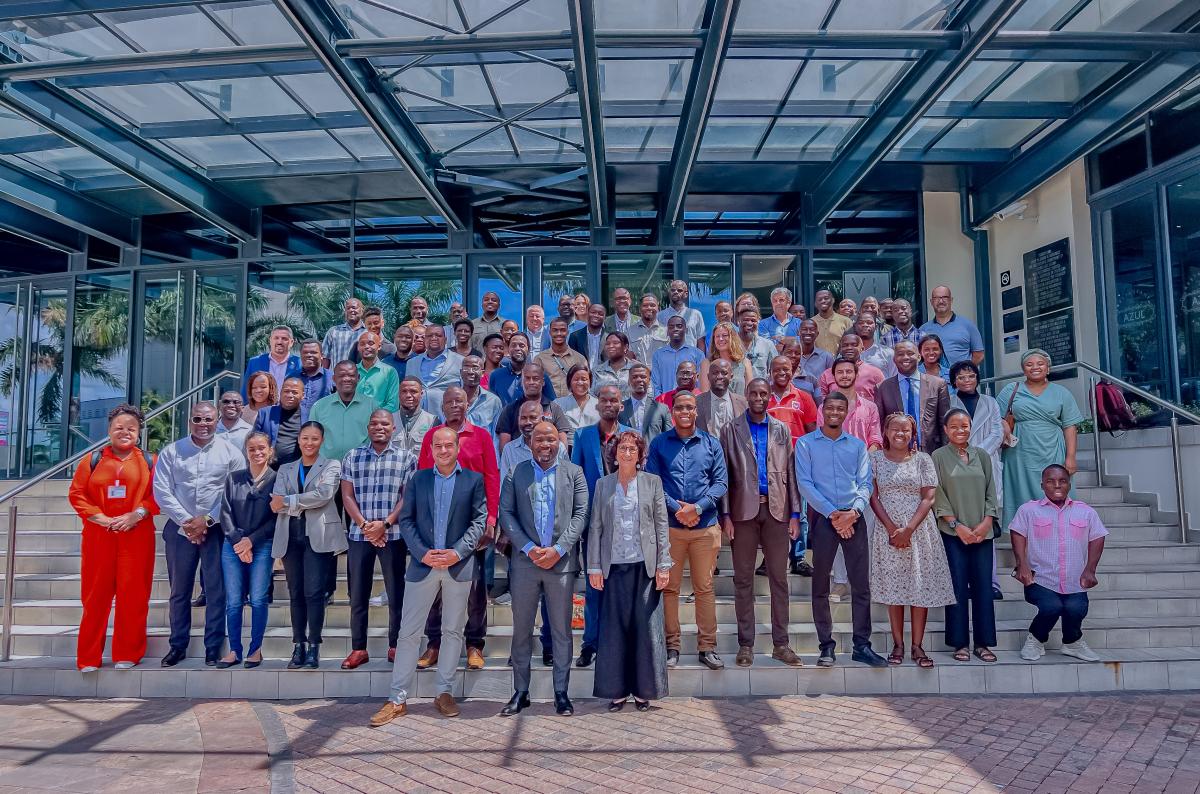
Mobilising market potential to scale solar-powered irrigation in Mozambique
Velsoma CUMBANA | 22/04/2025
Enabel Mozambique recently convened a roundtable to explore the opportunities and challenges of scaling solar-powered irrigation schemes across the country. Over 200 participants including financiers, private sector actors, government representatives, and international cooperation partners attended the event, reflecting the growing interest in this innovative and climate-smart solution. Through the Renewable Energy for Rural Development Project (RERD2+), Enabel has already stimulated demand for solar irrigation among farmers by co-financing up to 80% of initial investment costs. These systems offer a compelling alternative to traditional diesel-based irrigation: they drastically reduce operational expenses, minimize environmental impact, and enhance climate resilience in rural communities. “Solar-powered irrigation is not just a technology shift but it’s a pathway for farmers to grow commercial farming and capture agribusiness potential in a climate-resilient way,” said Jan Verlaak, Project Manager at Enabel Mozambique. With more than 500 solar irrigation systems co-invested through RERD2+, demand has already begun to outpace the program’s financing capacity. To keep momentum, Enabel brought stakeholders together to identify strategic pathways for expanding this rapidly growing market. “No single actor can unlock the full potential of solar irrigation in Mozambique; it requires coordinated action between government, finance, and the private sector” emphasized Eng. Delfim Vilissa, Director of INIR (National Irrigation Institute - implementation partner for the project). The consensus that no single institution can resolve all market constraints underscores the need for partnerships involving government authorities, financial institutions, and the private sector. Defining smart co-financing mechanisms and creating a level playing field for the private sector Participants broadly agreed on the urgent need to facilitate investment for solar-powered irrigation systems. Although operational costs are relatively low, high upfront capital requirements remain a significant barrier for farmers—further compounded by a lack of effective agricultural financing mechanisms. To unlock the technology’s full potential, developing smarter, more accessible co-financing models is critical. While many development partners already offer co-financing for solar irrigation equipment, approaches vary widely, from full subsidies to fixed percentages (e.g., 50% or 70%). Such inconsistencies can inadvertently create competition between donor-funded programs in the same regions. Enabel will therefore assess optimal co-financing thresholds based on farmer typologies to maximize development impact, preserve market integrity, and enable service providers to grow sustainably. Service providers at the roundtable also pointed to burdensome and unclear taxation and import procedures for irrigation equipment. Although Mozambique offers favourable tax conditions for fully imported kits, many providers use a hybrid approach—importing pumps while sourcing other components locally. Resolving these regulatory and customs bottlenecks will be key to fostering a fair and competitive market. A follow-up strategy will outline reforms to ensure this level playing field. Strengthening the private sector for long-term successStakeholders agreed that the long-term sustainability of solar irrigation hinges on fortifying the private sector. Farmers must be familiarized with new technologies, while local service providers need support in accessing public tenders and offering solutions in remote areas. Adapting public procurement frameworks to include local solar-based innovations—and ensuring capacity-building for local businesses—can make it easier for domestic providers to participate effectively in tender processes.However, sustainability challenges remain, especially regarding service provision in remote communities. High operational costs for providers often hinder outreach to isolated areas. Supporting locally adapted business models and strengthening supply-demand linkages will be essential for continuous, rural-based service provision. “Co-financing must be targeted not to disrupt, but to empower the private sector—ensuring local service providers can grow their businesses while expanding access to climate-smart solutions,” noted Sophie Teyssier, Rural Development Specialist at Enabel Mozambique. A roadmap for capturing the market potential of solar irrigation The roundtable served as an important step in building a platform for inclusive, evidence-based policy dialogue. Enabel will continue the collaboration with INIR and work with partners to design a comprehensive roadmap for scaling solar-powered irrigation in Mozambique. This plan will clarify regulatory frameworks, align financing mechanisms, and embed private sector–driven solutions within broader development initiatives. The commitment from all stakeholders to unlock solar irrigation’s potential reflects a shared vision: one in which Mozambique’s farmers can harness agribusiness opportunities through sustainable, affordable, and climate-resilient technologies.
-
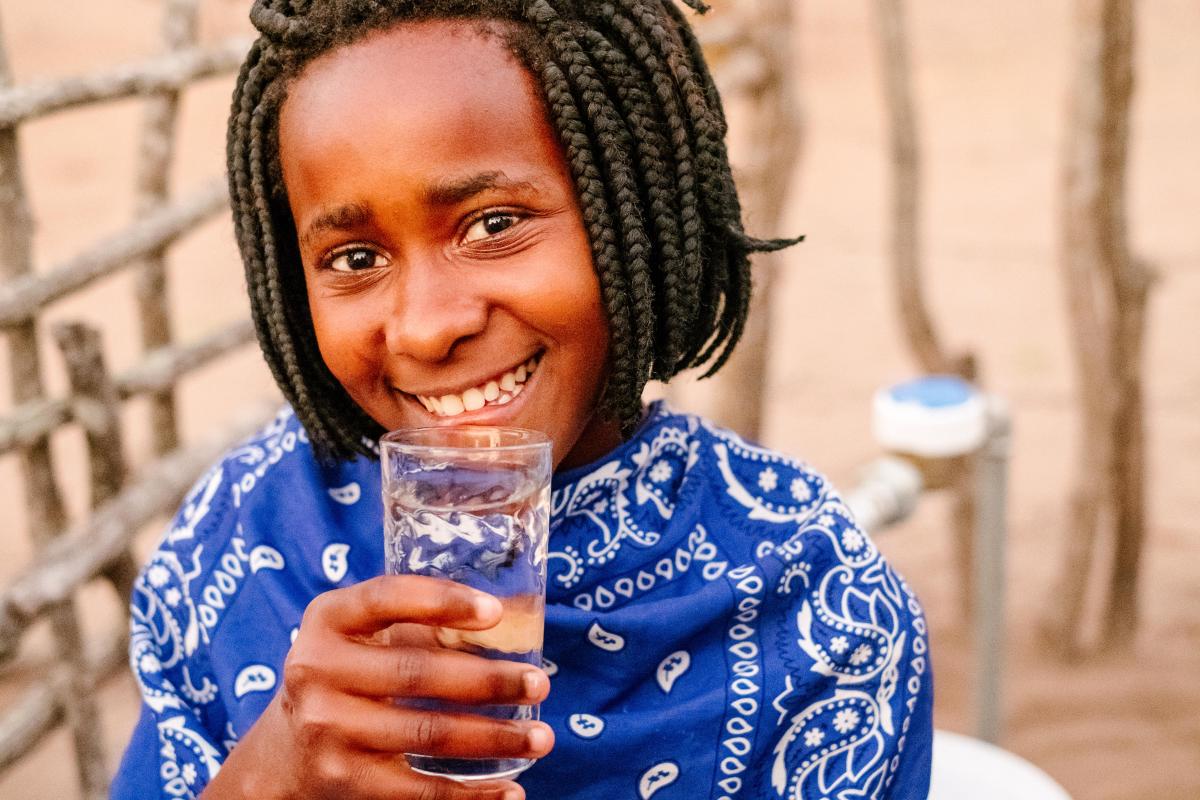
Bridging the knowledge gap to address Mozambique’s 60% drinking water loss
Velsoma CUMBANA | 03/03/2025
Access to clean water and basic sanitation is essential for the quality of life of all human beings and, consequently, for global development. Our current portfolio acknowledges this reality, as well as the challenges and opportunities inherent in this critical sector. Throughout our work, it has become evident that addressing these challenges requires more than isolated solutions. It demands a cross-sectoral approach involving effective collaboration between public and private sector institutions. We have been working closely with key partners, such as the DNAAS (National Directorate of Water Supply and Sanitation), and promoting dialogue with the private sector. This collaboration unveiled the complexities of the sector and the need for integrated solutions that not only meet immediate needs but also build a more efficient, inclusive, and sustainable future for all.Navigating the Duality: Need vs ProductivityA recent event with the engagement of the private sector aimed at discussing training gaps for Water and Sanitation Technicians highlighted some of the sector’s most pressing challenges. One striking finding was the alarming figure that around 60% of water produced is not billed due to losses along pipelines and theft. The main culprit was identified as the significant gap between technical capacity and technology advance, particularly in the control and maintenance of modern systems. With the evolution of the sector, technicians are now expected to demonstrate creativity, work autonomously or collaboratively, record information, critically analyse data, and propose innovative solutions. Mr. Dário Amade, General Manager of AfriDev Mati, a company playing a pivotal role in Mozambique's water supply sector since 2012, emphasized the need to form more technically skilled professionals capable of handling these emerging technologies. For Dário, this not only benefits the community by ensuring continuity but also incentivises companies to invest in the sector on the long term with a wider pool of qualified technicians to meet the demands of the labour market. Proposed Solutions and Collective CommitmentThanks to the active involvement of our partners, we have designed solutions that go beyond theory. One of the central proposals was to update the sector’s curriculum to include advanced technologies such as desalination, photovoltaic and automation. The discussion also emphasised the need to develop practical skills in areas such as loss management and photovoltaic installations. All of this framed within an approach that incorporates gender considerations and environmental safeguards, ensuring progress is inclusive and responsible.What Now? Our Realistic Action PlanWith DNAAS in-depth knowledge of the sector and private sector representatives providing valuable insights into market demands and emerging technologies, an action plan was defined as follows: Focus on Priority Courses: supervision, loss management, electrical installation and photovoltaic systems, and plumbing and desalination. Training Strategy: Short-term programmes (1 week to 3 months), tailored to local needs and covering both public and private sectors. Focus Locations: Maputo and Gaza were chosen to pilot these training sessions. Joining Forces for the Future This event reinforced the importance of partnerships as catalysts for transformation. By combining efforts with DNAAS, private sector, WASH training centers namely: CFPAS and FIPAG Academy, we are creating sustainable and impactful solutions that will benefit the entire ecosystem of the sector: communities, public institutions, technicians and businesses. We are excited about the next steps and confident that, together, we can turn challenges into opportunities and build a future where access to water and sanitation is more efficient, equitable, and sustainable. If you, too, want to be part of this transformation, stay tuned to our pages and follow us on this journey.
-
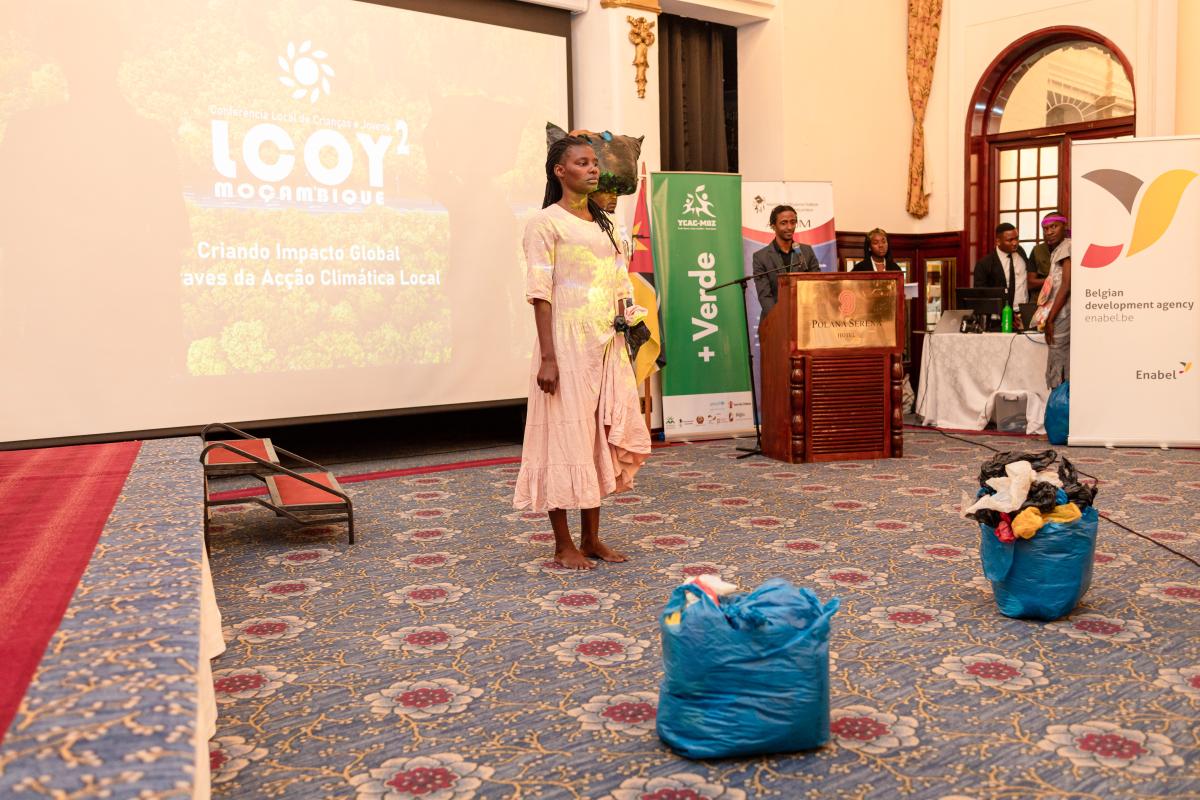
Mozambican Children and Youth Leading the Way in Climate Action
Velsoma CUMBANA | 18/10/2024
On August 22-23, 2024, Maputo became the stage of a movement for change during the Second official UN-endorsed national Local Conference of Children and Youth on Climate Change in Mozambique (LCOY-Mozambique). LCOYs are hosted every year in over 120 countries prior to the UN Conference of Parties (COP) and serve as a space to amplify youth climate action ahead of international conferences. In Mozambique, the Youth Climate Action Platform (YCAC-MOZ), serves as the official organiser and representative of the LCOY and is supported by a network of partners, including Enabel – the Belgian development agency. This year, the conference brought together over 150 young people from across Mozambique. A pivotal moment of the event was the ratification of the Youth Climate Declaration, a document symbolising the leadership and commitment of Mozambique's youth in addressing climate change. Building the Future Today The ratification of the Declaration was a significant affirmation of the readiness of Mozambican youth to take a leading role in climate action. This document captures the hopes and concerns of a generation acutely aware of the environmental challenges we face. It reflects their resolve to be at the forefront of developing practical and sustainable solutions. Over the course of the two-day conference, participants engaged in deep discussions on crucial topics such as Nationally Determined Contributions (NDCs), Carbon Markets, Human Rights, Energy Transition, Water, Health, and Biodiversity. Mozambique is in the process of elaborating its 3rd NDC, which represents a roadmap for the future, guiding investments in clean energy, climate adaptation, and sustainable practices, which can directly impact youth employment and education opportunities. These discussions were closely tied to the lived experiences of the youth and their communities. On a Carbon Markets focused panel discussion featuring Xana Maunze, Climate Finance Officer at Enabel and a youth climate advocate, through interactive panels, they not only expanded their understanding of these issues but also identified actionable strategies that can be implemented locally. A Roadmap for Change This Declaration, ratified at the conference’s conclusion, serves as a manifesto for the urgent needs and priorities of the present time. It provides a clear roadmap for the commitments and actions these young leaders plan to demand for, promote and pursue. The Declaration calls for concrete steps, including: Organizing inclusive public consultations and workshops to incorporate youth perspectives into Mozambique’s NDCs. Ensuring the broad dissemination of climate policies across all societal levels, particularly in rural and vulnerable communities.Establishing national and local actions for climate mitigation and adaptation, with clear emission reduction targets and the promotion of sustainable agricultural practices. The document will be shared with both public and private entities to ensure that the perspectives of youth are integrated into policy-making and climate action initiatives. Youth as Agents of Change This initiative marks the beginning of a continuous process of engagement, learning, and action. It underscores that Mozambican youth are not merely recipients of development projects but are active leaders in the implementation of climate solutions. Their determination and creativity in addressing climate challenges are evident, and Enabel is privileged to support them as they bring their ideas and projects to life. This is the power of youth: creating the future today. Together, we can ensure that this future is sustainable, inclusive, and just for all.
-
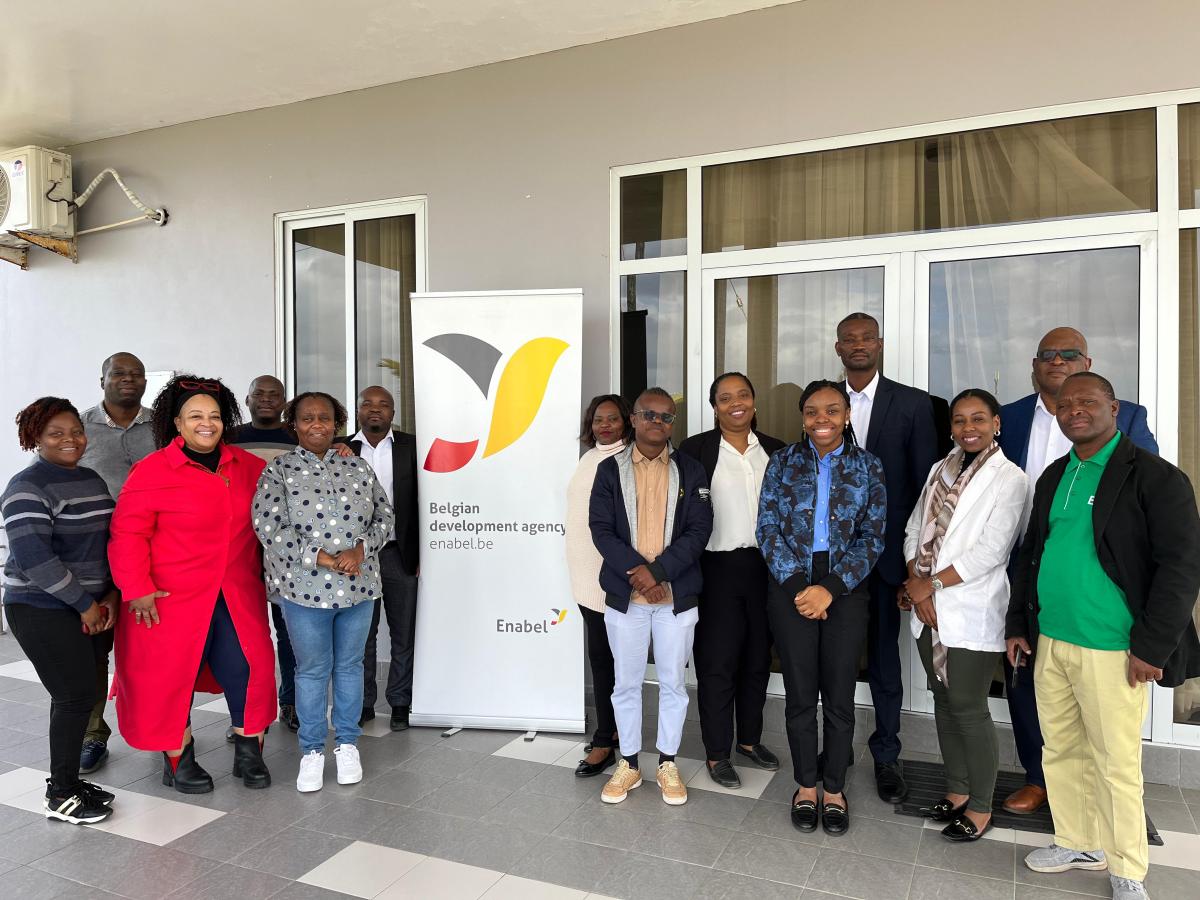
Mozambique: Advancing National Climate Finance Mobilisation with our new Readiness Programme
Velsoma CUMBANA | 06/08/2024
In recent months, Mozambique has made significant strides towards strengthening its institutional capacities for mobilising climate finance. In two important events held in July 2024, crucial initiatives were launched to accelerate and expand the mobilisation of climate resources in the country. Initial steps in MacanetaOn July 8 and 9, the inaugural seminar of the Green Climate Fund (GCF) activities in Mozambique was held in the district of Macaneta, a few kilometres away from the capital city. This event marked the beginning of the new "Readiness Programme" aiming at strengthening institutional capacities and coordination mechanisms to increase the mobilisation of climate finance. The seminar was attended by key stakeholders, including the National Directorate of Monitoring and Evaluation of the Ministry of Economy and Finance (GCF’s National Designated Authority - NDA) and the Advisory Committee, composed of representatives from various government sectors. The main objectives were (1) to inform about the new GCF Strategic Plan and Readiness Strategy for 2024-2027, (2) to present the Climate Investment Mobilisation and Planning Framework of the GCF-NDC Partnership, and (3) to outline the activity plan for the implementation of the Readiness Programme. During the discussions, challenges such as lengthy procedures for project proposal applications, the absence of a National Programme to guide the country's climate finance priorities, and the lack of nationally accredited entities were identified. Addressing the Challenges To directly address the challenges identified in Macaneta, a workshop was held on July 29 and 30 with the aim of defining priority sectors and projects for the development of the GCF "Country Programme." Ponta do Ouro was the stage for laying the groundwork for the implementation of climate projects in Mozambique and meeting the need for a National Programme to guide climate finance priorities. The first day of the workshop featured an overview of the new Readiness Strategy (2024-2027), ways to access GCF funds, and institutional arrangements to facilitate fund mobilisation. Discussions focused on submitting integrated projects to increase coverage and avoid duplication of efforts. The identified priority areas were: Electrification through mini-grids integrated with rural development approach. Water and sanitation, disaster risk reduction integrated with early warning systems interconnected with NAPs (National Adaptation Plans). Water preservation for community use through small dams and/or excavated reservoirs. Moving forward… The events in Macaneta and Ponta do Ouro not only marked the beginning of a new phase for climate finance in Mozambique but also highlighted the importance of a coordinated effort between the government, private sector, and other stakeholders. Strengthening institutional capacities and creating an efficient environment for processing climate projects are essential to ensure that Mozambique is prepared to face the challenges of climate change and achieve its goals under the Paris Agreement. In the coming months, meetings and other activities will be held to promote greater involvement of the private sector and various government sectors, with the ultimate goal of increasing climate finance mobilisation directed towards Mozambique.
-
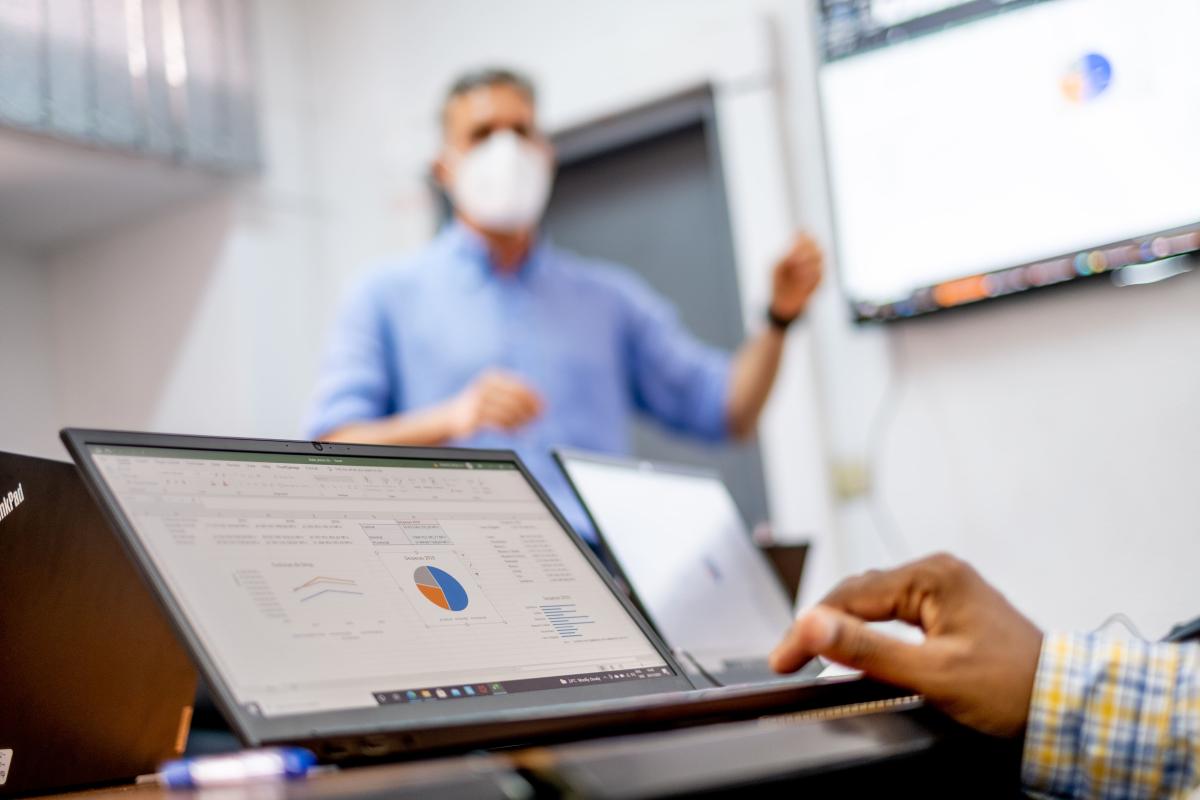
Strengthening health care financing: the public finance management transition in Mozambique
Velsoma CUMBANA | 26/03/2024
In the landscape of health service delivery, the management of public finances plays a crucial role. It is the invisible pipeline that ensures that resources flow to finance services, so communities and citizens receive the care they need. The efficiency and effectiveness of the provision of services depend on the well-functioning of the pipes' framework that is supposed and expected to remain invisible. Indeed, as one expects to have water when one turns the tap, one does not want to see the pipes that bring water into one's house. The PFM4SD (Public Financial Management for Service Delivery) project financed by the Government of Flanders has this declared objective enshrined in its name. The implementation of the Public Expenditure and Financial Accountability (PEFA) 2020 and its Action Plan was one of the means to achieve its objective. Starting the Race: A Journey of Adaptation Like any journey, ours has been filled with challenges along the way. Conducting the PEFA evaluation during the COVID-19 pandemic and the restrictions to gathering, posed logistical hurdles. But this wasn't exactly journey. Rather a relay race with obstacles that demanded strength, stamina, adaptability and the end of a phase marks the beginning of a new one. Passing along the baston. Come with us as we unveil each step of the race. The project played along with the hurdles and was able to transform them into opportunities that multiplied the visibility and the impact of the assessment: The final launching seminar was postponed because of COVID. What looked like a delay, become a lift from a powerful car. The PEFA Health was launched together with the National PEFA, with a larger audience and a broader forum that could look at PFM both from the point of view of the institution that has to keep the revenues and expenditures in equilibrium – the Ministry of Economy and Finance – and a sector that must provide services and therefore requires resources at the right time. The resources saved from the last seminar were used to elaborate an Action Plan to address the identified weaknesses. This was functional to pass the baton to government for tackling the system weaknesses and sitting on the bench for coaching. Overcoming obstacles The implementation of the PEFA evaluation and of the Action Plan represented more than just a checklist of tasks — it was an opportunity to invest in the capacity of personnel within the health sector. The project from the bench kept its commitment to support the team.Through targeted training programs and knowledge transfer initiatives, we mobilised our expertise and resources to empower technicians with the skills and knowledge necessary to drive sustainable change. One of our key achievements has been the implementation of technical improvements aimed at addressing longstanding inefficiencies within the sector. By focusing on capacity-development initiatives, we have contributed to the training of local technicians to analyse public financial management processes independently, fostering a culture of self-reliance and ownership. Passing the Baton: A Vision for Tomorrow Just like in a relay race, every end is followed by another start. Despite the progress made, challenges and opportunities for improvement remain. The implementing reforms and fostering behavioural change to improve the quality of public service – healthcare services for what we are concerned in this case - requires consistency as well as the capacity to identify and transform in opportunities that situation generates, without limiting the scope of its action to preset targets. Issues such as closing bank accounts outside the Single Treasury Account – (Conta Única do Tesouro - CUT) and settling overdue expenses stand out as areas that need continued attention and redoubled efforts. In addition, the need for capacity building and institutional strengthening remains pressing, especially regarding the planning and budgeting subsystem and investment and infrastructure management. Looking ahead, we envision a future where our assistance becomes obsolete, where our partners gain independence in identifying and resolving issues. We aim to pass the baton, disappearing like salt in water, leaving behind a legacy of strengthened capacity and empowered institutions. As we prepare for the next phase, we remain steadfast in our commitment to overcoming roadblocks and fostering effective policy-based budgeting. Our goal is clear: to ensure that resource management continuously enhances service delivery, paving the way for a healthier and more prosperous Mozambique. The Government will now use the resources from the Global fund to finance the new PEFA. The current thinking is that the evaluation will be done by the personnel of the sector. The external capacity will be responsible for training the people, oversee the entire process and guarantee the quality of evaluation. The project will be sitting on the bench coaching the people that take responsibility for the process.
-
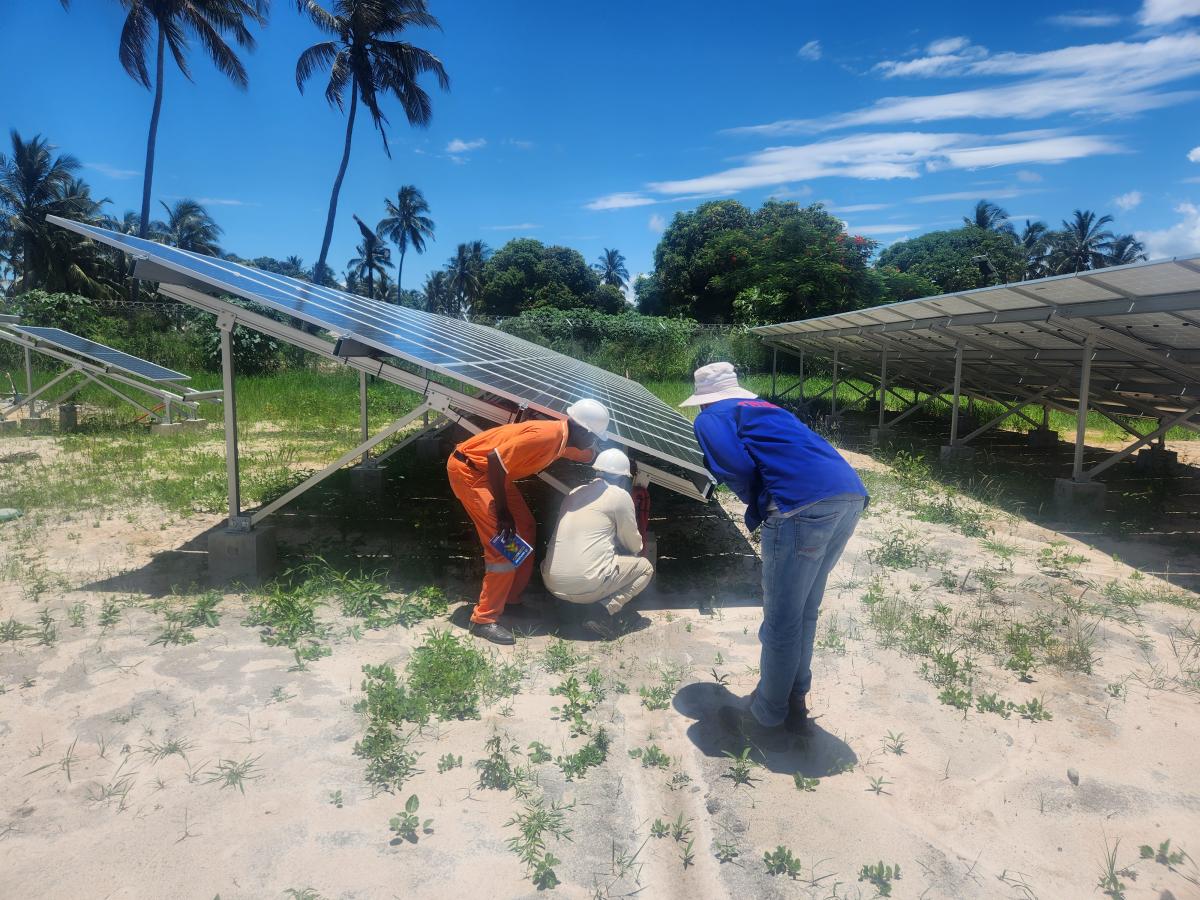
New hope arises for the inhabitants of Idugo Island in Mozambique, thanks to a solar powered grid
Alfredo MANDLATE | 23/02/2024
A major transformation will improve the quality of the life of the residentsLocated 72 kilometers from the village of Mocubela, a major transformation is taking place on the island of Idugo. The construction of the solar-powered mini grid will bring significant changes to the community and brighten the future of all residents by providing access to electricity on the island. This initiative is a crucial step towards improving the quality of life of the island's residents and boosting sustainable development in Idugo. For decades, more than 13,000 residents of Idugo (less than 10% have access to energy through small solar panels and batteries) faced major challenges related to electricity on the island. The lack of electricity limits progress and significantly affects the community's quality of life. Idugo is a fishing community. Currently, to preserve fish, residents need to travel to Pebane to buy ice, which is an hour away by boat and involves high costs. Additionally, health centers and schools on the island have limited operations once it gets dark. This fact makes the community leader of the island of Idugo, Mr. Felisberto Veloso, unhappy, he tells how hard it is to live on an island without electricity and what implications this brings to day-to-day life : “The population of the island of Idugo is composed of mostly fishermen and life becomes very complicated without energy, as we cannot store the fresh fish. To prevent the fish from spoiling, some are salting it and others are drying the fish in the sun. At the schools, we don't have night shifts and in hospitals, they use small battery-powered lamps, which makes night births very difficult and dangerous. Part of the population ends up leaving the island to build and live outside the island, in Pebane, Gurai, Tapata, and Mocubela.” This situation highlights the critical importance of access to electricity and how the lack of it impacts many aspects of daily life. The search for sustainable and affordable solutions to meet this need is fundamental to improving the quality of life of the inhabitants of Idugo. With the support of the Government of Mozambique (through the Energy Fund- FUNAE) and Belgium (through the development agency Enabel), a solar-powered mini grid is being built on the island to the relief and joy of the local population. This is a plant with a capacity of 230 kWp and 1330 kWh of storage, supplying energy to a distribution network with an extension of 4.2KM of medium voltage and 45KM of low voltage, and it will connect 1125 homes, commercial establishments, health facilities, schools, administrative building, churches and ensure public lighting for 200 public lamps in the 3 neighbourhoods of the island. A DREAM ABOUT TO COME TRUE! Since the start of the works in September 2022, the construction of the Idugo mini grid has been a constant challenge. The island of Idugo is only accessible by boat from Gurai (Bajone, Mocubela district) or Pebane. Furthermore, the rainy season significantly limits the possibilities for progressing the work. The absence of a pier for docking and unloading heavy equipment, such as generators and transformers, makes the construction of this mini grid extra challenging compared to the other mini grids under construction in Zambézia and Nampula Provinces. Currently, the works are progressing at a good pace, and the contractor (the ENERSOL/AZIMUT360 consortium with Mozambican subcontractor Tecnel) already has completed the construction of the plant and the battery house. This noticeable progress fills the local community with hope because it envisions the possibility of having finally electricity on their island and symbolizes the opportunity to further develop the island. February 1st will be remembered by all Idugo islanders, as well as for the team involved in the construction of the mini grid. That was the day the first posts of the distribution grid were erected. According to the Intervention Officer of the project, Arn Jonkers, “the installation of the first pole is a very important milestone for the project, since the construction of the distribution network is part of the mini grid construction that requires the most time. Idugo is only accessible via boat, which means that a mini grid and/or individual solar systems are the only options for the population to access energy. Furthermore, being a fishing community, they need energy to conserve fish, making access to electricity an significant catalyst for development on the island. So, Idugo is a classic example of productive use of energy in a mini grid”. With the ongoing installation of the mini grid, the island's residents can already dream about the big changes the mini grid can bring to their lives. What was almost impossible is now close to being a reality for residents. The community leader, Mr Felisberto Veloso, confirms this fact by saying, “years ago I could never have imagined that we could have energy, but now with the installation of the poles, the entire population already believes that they will actually be able to have energy. We hope to see changes on our island, we hope to finally see development arrive.” The development that the community leader talks about is centred on concrete points as he presents it to us, “for our schools, they could have night shift and this will mean that we will have more classes and more people studying in 2025, there are people who want to study, but it can only be at night. In the hospital, we will be able to have safe births at night. We already have residents who are building conventional houses and many of them have already given up on the idea of leaving the island because they know that development has already arrived. We have 3 markets and the stalls (stores) are increasing, many have already bought freezers, televisions and are just waiting for the power to be turned on”. The works are not yet finished, but it is with great satisfaction that we look at the enthusiasm that the community shows. The mini grid is more than cables, batteries, and solar panels, it is the promise of a better future for the Idugo Island community.The Idugo mini grid will provide clean and sustainable energy, boosting economic development and improving quality of life.
-
In Mozambique, the population of Muite expects electricity for the first time
Alfredo MANDLATE | 24/01/2024
“We waited for many years for electricity, and we never thought that we could one day have energy in our homes. With energy we will be able to have the opportunity to develop our village, as first we will have the houses and some streets surrounding the station's headquarters lit up, at the same time many business possibilities will open up, which will help to accelerate the development plans”, said the head of the Muite administrative post – Afonso Camueque In a first phase, a total of 1500 electrical energy connections will be developed in the administrative posts of Muite and Milhana, on a network extension of 30.4 km of low voltage and 5.5 km of medium voltage, through the construction of mini grids powered by solar panels and batteries. This initiative is the result of collaboration between FUNAE (Fundo de Energia) and Enabel in Mozambique, which aims to bring sustainable electricity to homes, schools, health centers, commercial establishments, police stations, churches, and public lighting in the two administrative posts. To monitor the progress of the ongoing construction works, a joint team composed of Enabel and FUNAE visited both locations. They held meetings with various local stakeholders, such as the district administrator, head of station and a delegation of the local community. On the occasion, the Administrator of the Mecuburi district M. Orlando Pedro Muaievano was very optimistic about the installation of the project in the two administrative posts in his district. According to the Administrator, the entry into operation of the mini grids will galvanize the economy. It will bring significant changes in the respective locations, as these are regions where, without this joint effort by Enabel and FUNAE, it would be difficult for the population to dream of electricity in their homes and communities. The original plan was to visit the two mini-grid plants, but due to the difficult weather and road conditions it was only possible to reach Muite. It was not possible to reach Milhana, because a truck got stuck on one of the small bridges on the access road to Milhana, blocking the whole road. The happiness and expectations of the population of Muite Upon arrival at the Muite Administrative Post, where one of the mini-grid plants is being built, the mission was received with joy by the head of the post along with Muite's community leaders. The presence of Enabel and FUNAE representation filled the local population with hope, and they followed the visit closely to understand all the aspects covered during the mission. The head of the post – M. Afonso Camueque, representing the entire population of Muite, expressed his satisfaction with the possibility of having electricity at the headquarters of his administrative post. He spoke about how this great milestone will impact the life of the Muite community, through creating business opportunities and improving quality of life.“With electricity, we will be able to have the opportunity to develop our village. As first, we will have the houses and some streets surrounding the station headquarters lit up, at the same time as many business possibilities are opening up, which will help to accelerate implementation of our development plans. Traders can now think about increasing the volumes of products that need to be stored in the cold thus increasing their business. Fishermen will be able to guarantee the conservation of their fish.” The head of the post continued talking about the advantages that electricity will bring to education and health in his village and how this will influence change. “Currently we only have one shift, which is daytime, but with access to energy, the schools will be able to start organizing classes in two shifts, daytime and nighttime. This even opens the possibility of starting with adult literacy training. At the hospital, our maternity ward is dark, and it is difficult to deliver babies at night. By having energy, women can give birth in safe conditions during any moment of the day, and we can improve the conservation of vaccines. ” The head of the station concluded by saying: “We are very happy and proud, because everything here is going to grow. The population around the town could grow due to the electricity and we will have more options such as entertainment places, people can now do business.” In addition to the head of the post, the queen of the village, Ms Joana Manuel and representing the women of the community, was one of the happiest voices with the installation of the Muite mini grid. She states that the electrification of the administrative post headquarters will add value to the entire community as it will bring development and increased business to the population of Muite. Queen Joana says: “I am very happy with the visit we received today, because it shows that we will certainly have electricity at our station. With energy, we will be able to have the opportunity to freeze our fish that is brought from the river and this way it will no longer rot even if it comes out in large quantities, and we can also have the opportunity to have mills and other things that need energy to function.” Still on this mission, we had the opportunity to visit and talk to Mr. Alifo Pedro Macassa at his home. He is a peasant and owner of one of the 1451 residences that are intended to be connected to the two solar mini grids. Resident of the Muite community and future beneficiary of the electricity generated by the Muite plant, he is very happy with the implementation of the infrastructure and the possibility of soon having electricity in his home. He tells us that with electricity, life will no longer be the same because you will be able to have lighting in your home. You will also be able to purchase electrical appliances that can improve your life and that of your family, as well as you can think about opening a business with electricity (for example through the purchase of a freezer). “With the energy that I will have soon, my life and that of my family will definitely change because first I will be able to light my house and I will install 4 lamps, I will be able to charge my phone in my house, I can now think about buying a television to be able to watch the news and then a freezer to be able to preserve my food such as fish taken from the Lúrio River and even create a business to improve our lives.”In addition to the construction of the mini-grid plant in Muite, the construction of a fountain around the plant is underway. This fountain could serve as a reinforcement to the water supply system for the residents and improve health conditions in that administrative post. These testimonies show how hopeful the population of Muite is about receiving electricity, as they have spent many years (and decades) hoping to have one day electricity in their homes with all the benefits that this can bring. These actions fall within the scope of the Renewable Energy for Rural Development project, Phase 2 (RERD2+) implemented by Enabel in partnership with FUNAE in the development and operation of sustainable energy services in rural areas.
-
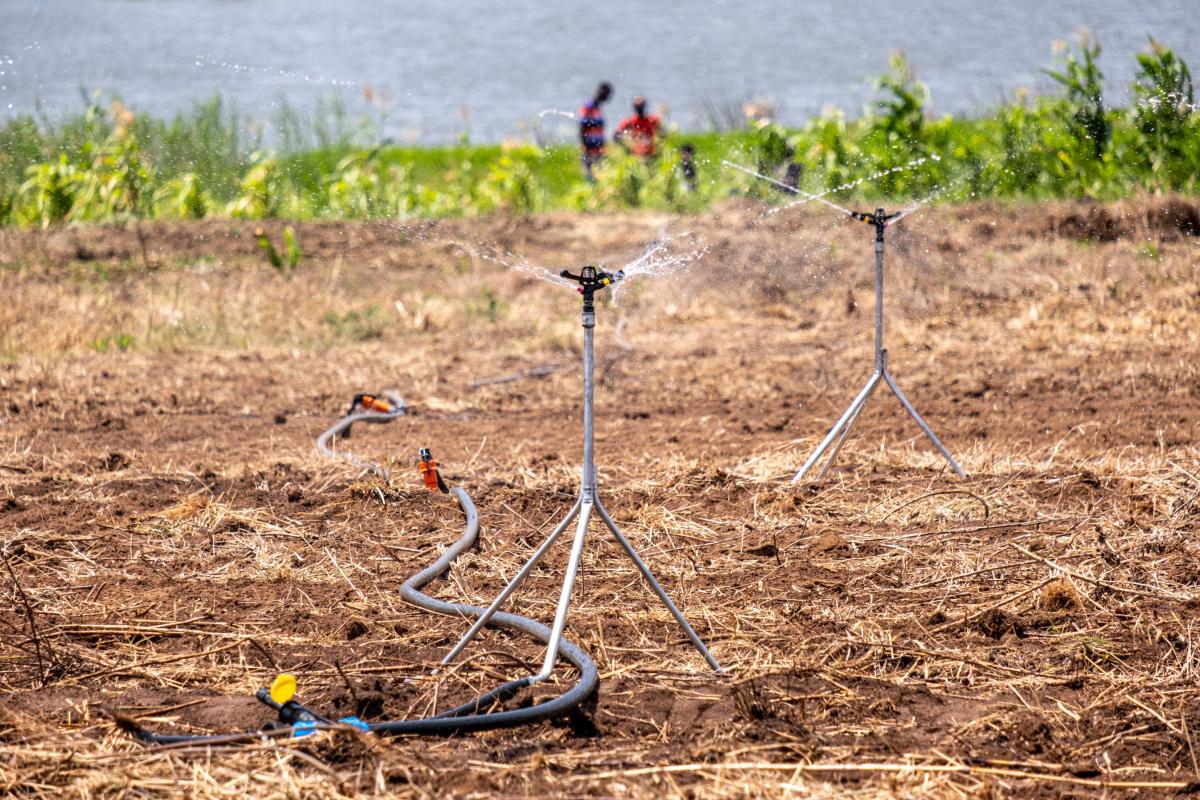
Promoting sustainable agriculture for a resilient future in Mozambique
Velsoma CUMBANA | 24/01/2024
Around 500 sustainable irrigation systems will be installed this year in the provinces of Manica and Zambézia. This initiative is part of the cooperation between Enabel in Mozambique, the Mozambican government, iDE (International Development Enterprises), and various educational institutions, aiming to boost sustainability and productivity in the agricultural sector. This was announced by our rural development expert,Sophie Teyssier, during her intervention at the annual irrigation subsector review meeting organized by INIR (National Irrigation Institute) on December 21-22, 2023. She presented the activity report of the irrigation component of the RERD2+ project (Renewable Energies for Rural Development Phase 2) throughout 2023 and outlined perspectives for 2024. The meeting had a broad participation from national and international technicians and researchers discussing topics related to institutional perspectives for INIR, such as: irrigation development planning, national irrigation registry, ongoing irrigation component projects, management, and intensification in irrigated areas, and hydrological infrastructure management in the context of climate change. The meeting was concluded by His Excellency Vice Minister of Agriculture and Rural Development, M. Olegário Banze. For this year, Enabel also plans to provide more training in agroecology, irrigation system repair, financial education, and business management for local producers.We are excited to continue with the materialisation of our commitment to build resilient and sustainable communities in the irrigation subsector.
-
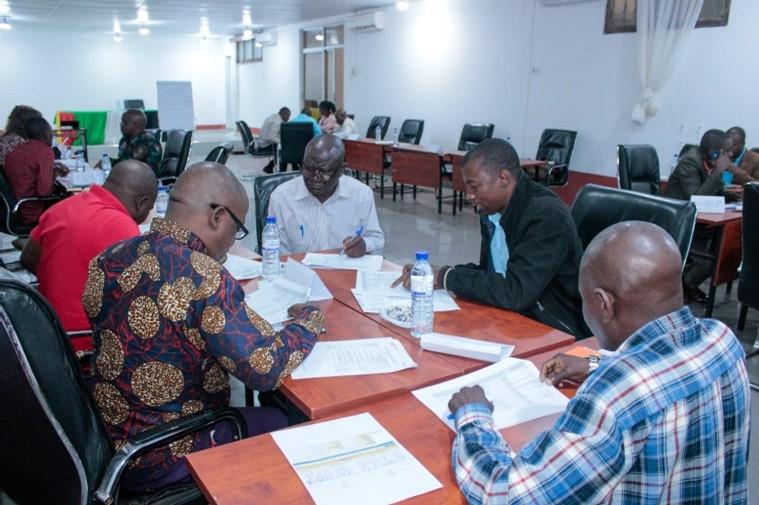
Empowering Mozambique's agriculture with solar irrigation
Akila MUNIR | 14/08/2023
By: Sophie TeyssierEnabel (Belgian Development Agency), in partnership with the National Energy Fund (FUNAE), have been implementing the second phase of the Renewable Energy Program for Rural Development (RERD2) since 2018. At the request of the Government of Mozambique, a solar irrigation component has been introduced, which provides for the supply and installation of irrigation systems largely subsidized by the project, to small (900), medium (100) and large (10) farmers. In addition to the equipment, the project supports as their training in the appropriate and profitable use of these expensive systems. This additional component started in 2021, in partnership with the National Institute of Irrigation (INIR) and is denominated as RERD2(+). Since then, numerous preparatory actions have been carried out, emphasizing the identification and sensitization of potential beneficiaries of the program, as well as the mapping of areas with agricultural potential for the use of solar irrigation systems (SPIS). The process was carried out with the District Services of Economic Activities (SDAE), in coordination with the Provincial Services of Economic Activities (SPAE) and the Provincial Directorates of Agriculture and Fisheries (DPAP) of the Provinces of Manica and Zambézia. Recently (February 2023), an agreement was signed with International Development Enterprise (iDE), an international NGO, for the management of the program grants. Beneficiary prioritization criteria and an “expression of interest” form have been developed by Enabel to guide the beneficiary selection process. The beneficiary selection process is sensitive and delicate, which is why the active participation of key local actors is important in order to guarantee transparency, justice and inclusion. In the current year, the program provides for the selection of 260 producers; as well as the allocation and installation of 150 SPIS, distributed between the two provinces of intervention. The project carried out two workshops in May – one in Manica Province and one in Zambezia Province - to present and discuss with the local authorities what are the access and priority criteria for producers who are interested in the acquisition of these systems. Additionally, the workshops also went through the “expression of interest” form which interested producers will have to fill in, with the help of extension workers.This form will make it possible to assess the current production conditions, and the ability of the applicants to contribute to the acquisition, to use the equipment correctly and profitably, and to ensure its maintenance. It will also be used to establish a “base-line” database. The workshops took place in the two beneficiary provinces of the project, with Enabel's institutional partners. Representatives of the provincial services of Agriculture and the directors of the agricultural extension services of each of the concerned districts participated. The two workshops were particularly lively, with group work that allowed everyone to deepen their understanding of the priority criteria and to participate actively. With the presentation of action plans from the implementing partner iDE, they showed the departments concerned that the project would, as the Extension services stated, “finally start” on the ground. It actually did start, but the installation of SPIS is the “concrete action” expected since the official start of the project - 2 years ago. There is significant excitement for the deployment of these systems on the ground and the second semester of 2023 is expected to demonstrate concrete results.
-
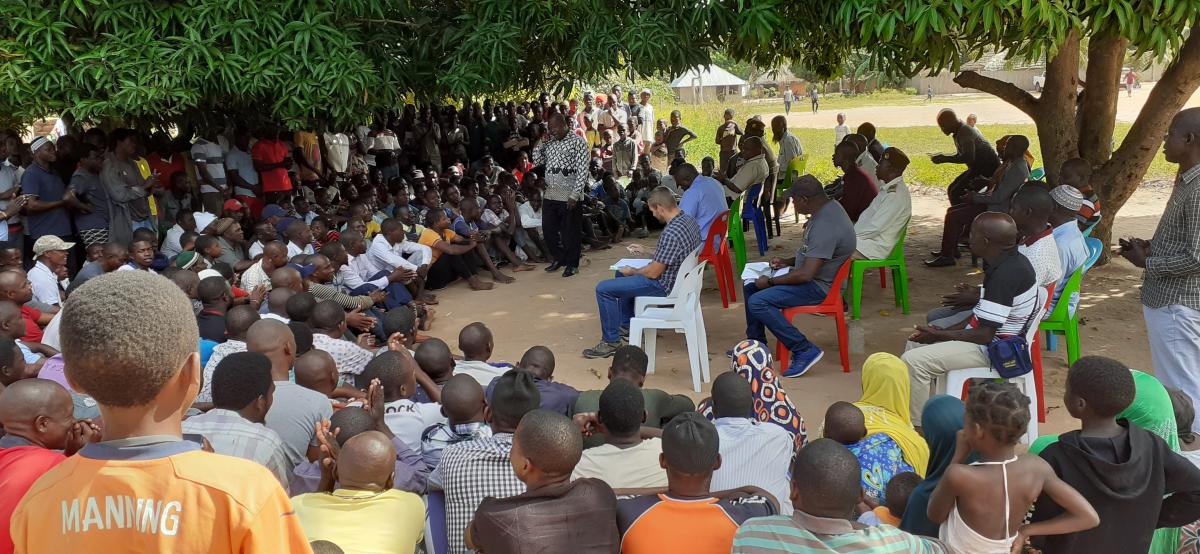
Supporting mini grid development in Mozambique: planning and preparation are key to successful delivery
Akila MUNIR | 17/07/2023
The National Energy Fund (FUNAE) is responsible for providing energy access solutions to the (rural) areas which are far located from the national electricity grid in Mozambique. An important task, considering that the Mozambican government has set the target to realize universal energy access by 2030. The project Renewable Energy for Rural Development, Phase 2 (RERD2+) of Enabel aims to support FUNAE in the development and operation of sustainable energy services in rural areas. One of the project's primary result areas is increasing energy infrastructure, and in coordination with FUNAE, the construction of 5 mini-grids powered by solar panels and batteries in the provinces of Zambézia and Nampula, were agreed upon.Mini-grids are a long-term project characterized by an extensive preparatory phase. Because Mozambique is still developing a national "energy access plan", determining which areas are considered to be electrified by the national grid and which areas by stand-alone mini-grids (Enabel also supports the planning division of FUNAE in the development of these plans), FUNAE and Enabel had to conduct more than 20 socio-economic feasibility studies in the communities of rural Zambézia and Nampula to verify if the technical conditions are present for the realization of a mini-grid and to collect demographic and economic data for the sizing of the mini-grid. Based on these studies, 5 sites were selected to realize mini-grids. Because of the technical complexity of these (hybrid) mini-grids, the public procurement for the design and construction of the mini-grids followed a lengthy process to allow the Project Implementation Unit (FUNAE and Enabel) to negotiate, within the parameters of the applicable legislation, the most appropriate design and adequate technology for the reality in Mozambique. The negotiations allowed for a preliminary quality assurance of the technical proposals, as it was the first time Mozambique would be building hybrid mini grids of this calibre. The contracts were awarded to two construction consortias, which included international and national firms. Another critical step in the preparations for the mini-grid projects was the selection of the beneficiaries in the 5 communities. Because of budget constraints, FUNAE and Enabel decided to continue constructing 5 mini-grids but to only connect ca. 40% of the target population in the first phase. Priority was given to beneficiaries with a social function,such as the local hospital and schools, and beneficiaries who can create economic value in the community, like shops and artisans. The community selected the remaining beneficiaries, thus households and families of the project, based on some technical indications shared by FUNAE. This increased the awareness and support in the communities for the project and resulted in an excellent socio-economic mix of families, which will be initially connected to the mini-grid. After the work of the community, a team of FUNAE, Enabel and the contractors collected all the data of the beneficiaries on the field, using tablets and a digital survey developed by the Project Implementation Unit (Enabel and FUNAE staff). To ensure that more beneficiaries can be connected in a later stage, the project already imposed some technical measures during the design of the mini-grids. For example, a bigger plot to install additional solar panels, a powerhouse with extra capacity and an electrical grid that already covers a big part of the community. After this long preparatory phase, the construction of the mini-grids has started. On all 5 sites, the civil works have been initiated and the containers with batteries have arrived. Recently, FUNAE and Enabel engineers were together with the supervisor, who guarantees the daily monitoring of the works, on the field to inspect the delivered containers and evaluate the quality of the executed works. The completion of the 5 mini-grids is expected between the last quarter of 2023 and first quarter of 2024. The work does not stop after the construction of the mini-grids. It is vital to work on the stimulation of productive use of energy and business development, to improve the sustainability of the mini-grid operations and the overall development of the communities. This can be done by introducing specific electrical equipment in the communities, like energy-efficient electrical corn mills, and setting up financial structures to allow the people in the communities to buy this equipment. This part of the project will be initiated by the team of RERD2, and elaborated more specifically as part of the new portfolio in Mozambique for 2023-2028. This way, Enabel establishes continuity in its projects on the field and in its engagement to support Mozambique in climate change mitigation and energy transition. To read more on the portfolio, click here:https://www.enabel.be/brochure-belgium-mozambique-cooperation-programme-2023-2028/By: Arn Jonkers and Riccardo del Citto
